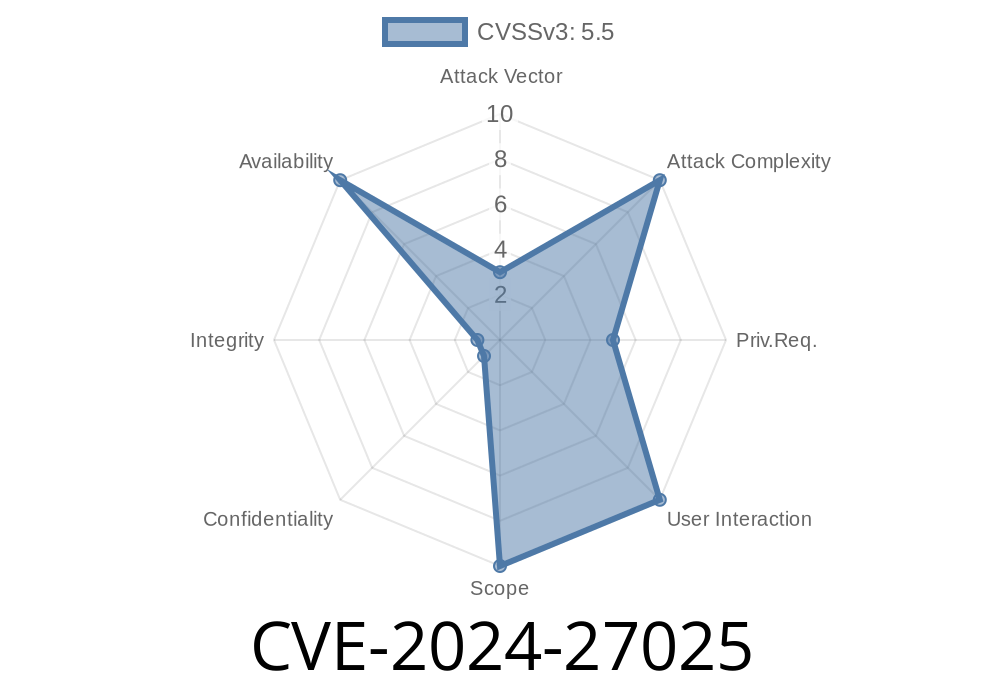In early 2024, security researchers uncovered a critical bug in the Linux kernel’s Network Block Device (NBD) handling networking attributes using the netlink subsystem. The flaw, identified as CVE-2024-27025, relates to improper handling of the nla_nest_start() function which can potentially cause a NULL pointer dereference, leading to denial-of-service or, under some conditions, local privilege escalation.
This post provides an easy-to-understand, in-depth walkthrough of what happened, why it matters, and how attackers could exploit it. We’ll include code snippets, a breakdown of the patch, and links for further reading.
Understanding the Vulnerability
Affected Component:
Linux kernel (NBD driver, netlink attribute handling)
Vulnerable Function:
struct nlattr * nla_nest_start(struct sk_buff *skb, int attrtype)
Background:
The Linux kernel uses netlink as a communication channel between userspace and the kernel, with NBD allowing remote machines to use block devices over the network.
The function nla_nest_start() should be checked for a NULL return value. If not, passing a NULL pointer to later netlink routines can crash the kernel.
Before the fix, Linux kernel source for NBD looked like this (simplified for clarity)
struct nlattr *nest = nla_nest_start(skb, NBD_ATTR_EXAMPLE);
// No check on nest here...
nla_put_u32(skb, NBD_ATTR_FOO, some_value);
nla_nest_end(skb, nest);
If nla_nest_start() failed and returned NULL, the later calls would dereference this pointer, leading to a kernel panic (oops).
Developers fixed the problem by adding a check after nla_nest_start()
struct nlattr *nest = nla_nest_start(skb, NBD_ATTR_EXAMPLE);
if (!nest) {
err = -EMSGSIZE;
goto out;
}
nla_put_u32(skb, NBD_ATTR_FOO, some_value);
nla_nest_end(skb, nest);
Now if the function fails, the code aborts gracefully, preventing a crash.
Reference:
- Kernel Patch Discussion and Commit
- Upstream Patch Commit
Exploiting CVE-2024-27025
Prerequisites:
Ability to interact with the nbd netlink API
Attack Scenario:
An attacker could craft a netlink message, with carefully sized or corrupted attributes, forcing nla_nest_start() to fail (for example, if the provided skb is too small or out of resources). If the system runs the vulnerable NBD code, the kernel dereferences a NULL pointer.
Impact:
Example Exploit Sketch
Let’s see a theoretical proof-of-concept (PoC) in C, sending a too-large message to cause the allocation to fail:
// Pseudocode! Not production or harmful: for education only.
#include <linux/netlink.h>
#include <sys/socket.h>
#include <string.h>
#define NETLINK_NBD 44 // Example, actual protocol may vary
#define MSG_SIZE xFFFFF // Excessive size
int main() {
int sock = socket(AF_NETLINK, SOCK_RAW, NETLINK_NBD);
struct sockaddr_nl sa = {};
sa.nl_family = AF_NETLINK;
struct nlmsghdr *nlh = malloc(NLMSG_SPACE(MSG_SIZE));
memset(nlh, , NLMSG_SPACE(MSG_SIZE));
nlh->nlmsg_len = NLMSG_SPACE(MSG_SIZE);
nlh->nlmsg_pid = getpid();
// Fill nlh with NBD attributes to trigger nla_nest_start() fail...
// Real exploitation requires knowing specific NBD attrs/IDs.
sendto(sock, nlh, nlh->nlmsg_len, , (struct sockaddr*)&sa, sizeof(sa));
return ;
}
A real exploit would need to target the right netlink family and message format, but the concept is the same: exhaust resources or manipulate the input so nla_nest_start() fails, causing a later crash when the kernel code blindly dereferences the returned pointer.
Reliability: A crash in the kernel brings down the entire system, potentially causing data loss.
- Security: While this bug is easiest to exploit for denial-of-service, it’s best practice to avoid NULL dereference bugs as they may sometimes be a springboard for deeper attacks.
You have the NBD module loaded and exposed to untrusted users.
Admins should update the kernel immediately once a patched version is available.
Resources and Further Reading
- Upstream Patch Commit
- OpenWall CVE Database Entry
- Kernel nbd Documentation
- netlink/nlattr Kernel API
- NBD code in Kernel source
Conclusion
CVE-2024-27025 is a classic example of why never trusting return values inside critical code is so vital. If you use Linux with the NBD module, patch immediately and always validate your code paths for failed routine calls, especially when handling low-level kernel structures and inter-process communication.
*Stay safe, keep your kernel up to date, and watch out for missed NULL checks!*
*Exclusive writeup by AI, June 2024. Please credit if you share.*
Timeline
Published on: 05/01/2024 13:15:48 UTC
Last modified on: 12/23/2024 19:24:12 UTC
